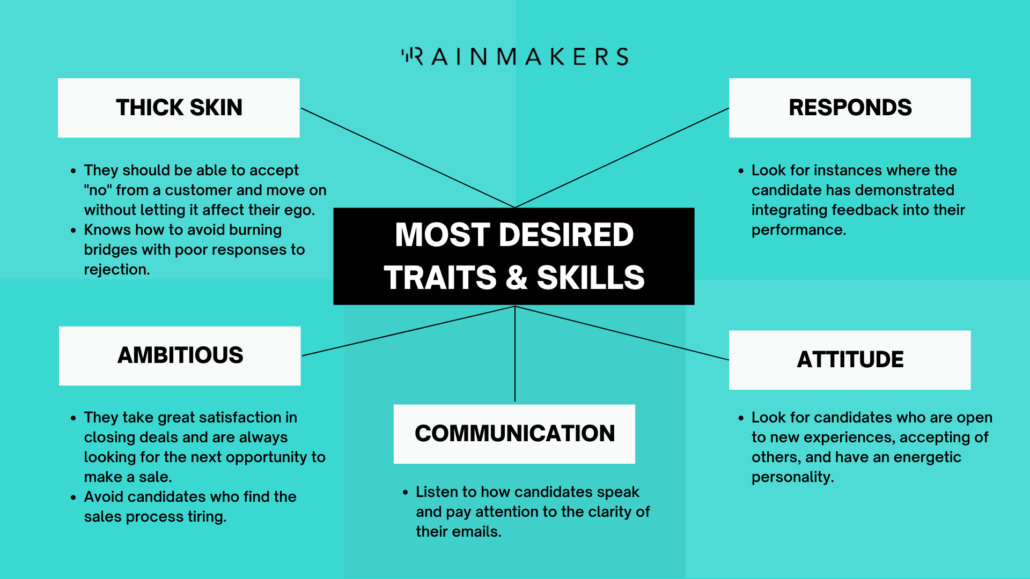Building a Strong Sales Team: Traits and Qualities to Look For
Avoiding Hiring Mistakes: What to Look for in Sales Candidates
What should you look for when recruiting sales professionals? What qualities should they possess? How can you tell if a potential hire will succeed or if they are just good at doing interviews?
There are several time-tested traits you should keep an eye open for. By selecting sales reps with these qualities, your business will be more profitable and more likely to succeed. Consider reviewing these traits among your current sales staff to see who might need some coaching.
Consider the following candidate traits and skills:
They Understand the Importance of Following Up
Effective follow-up is one of the abilities that separates the all-stars from mediocre sellers.
Deals are closed through follow-up, so if a candidate understands this as early as the hiring process, you can be more assured that they will be effective at following up with clients and sales.
As essential as conducting follow-ups is, how they do so is also an important indicator of success. Avoid candidates who give off a strong sense of desperation and argumentativeness.
A Thick Skin
A strong sales close consists of three components: asking early, asking frequently, and accepting the answer “No.” Unfortunately, some salespeople become agitated when a customer rejects them—some end a call with an abrupt hang-up or by taking on a hostile tone.
A good salesperson understands that they may need to move more quickly or that the customer has legitimate reasons for hesitation. They know how to get past a “no” and how to ask, “What’s the process we need to go through to get you ready to buy?”
Or, an insightful salesperson knows when it’s time to move on and not let it threaten their ego or sense of self-worth. In any of the above cases, the best salespeople also know when not to burn any bridges with poor responses to rejection.

They’re Proactive and Ambitious
Top performers are inspired by an intense drive to succeed. As a result, they react favorably to competition, which you can leverage using friendly sales contests, and take great satisfaction in closing deals.
While some individuals may find the sales process tiring, a top-notch sales representative will feel invigorated by the challenge and always be on the lookout for the next big sale.
Accepts Feedback Well
This can be tricky. Everyone says they’re open to feedback—and some will actively seek constructive criticism—but many push back or ignore feedback. Unfortunately, this means problems with performance or teamwork may end up continuing.
What’s worse is that it can be challenging to identify those who are serious about accepting and taking advantage of feedback. If possible, look for instances where the candidate can demonstrate integrating feedback into improving performance.
Solid Communication
An effective salesperson needs excellent communication skills. They need to talk a good game, have empathy, be good listeners, and have solid writing skills—particularly when composing emails.
When communicating with prospective hires, listen to how they speak. For example, are there many pauses, mumbled words, or confusing phrases used? Likewise, are their email communications clear and free of typos or poor grammar?
All of this counts. Your salesperson is a representative of your company, and the first impression many customers have with your company is through your representatives’ phone calls and emails.
A Positive Attitude
Much of a salesperson’s time is spent interacting with several different types of people—not just prospects but coworkers, management, customer support, and others. They must therefore exude a positive attitude that uplifts anyone with whom they come into contact.
In addition, the candidate should be open to new experiences, accepting of others, and genuinely interested in developing relationships. This can be tricky to determine during an interview, but try to understand the candidate’s energy level at work.

What Are Some of the Biggest Red Flags To Look Out For?
There are a few negative traits you may want to watch when conducting interviews. In addition, certain warning signs can inform you what candidates will likely not be a good fit for your company.
- They lack professionalism – This should be pretty easy to spot. A professional candidate speaks well, dresses well, and conducts themselves like they are trying to make a good impression.
- They are risk-averse – Candidates who take a long time to come to a decision—particularly a big decision—may have similar problems going after big-ticket customers. You want a salesperson who is willing to take some risks.
- They seem to have little self-awareness – Asking candidates about their biggest strengths or weakness are valid interview questions. However, candidates who take too long to come up with an answer or a weak response may have some blind spots when it comes to how well they can perform or suffer from a lack of honesty about themselves.
- They don’t have a growth mindset – Ask the candidate when was the last time they learned a new skill or did something to improve their performance. Salespeople who don’t look for ways to change or advance themselves do not do well in long-term sales positions.
- They confuse confidence with arrogance – Be mindful of whether a potential sales hire seems too confident. It can be subtle, but some people turn confidence into a sense of arrogance, making them more challenging to coach. They can also be less receptive to feedback.

Common Mistakes Made During the Recruitment Process
You need a solid hiring procedure with checks and balances in place if you want to recruit well. Here are some common mistakes to avoid.
- Writing unclear job descriptions – A job description should tell the prospective salesperson what the job is like, what you’re looking for, and what qualities and experience are desired.
- Running a disorganized interview – It’s essential to prepare for each interview. Have your list of questions ready. Ensure the person you’re meeting with matches up with the resume in front of you. Be prepared to answer the most likely questions the candidate will have.
- Hiring based solely on a resume – A resume is just a summary of where the candidate worked and what they did there. While a resume might list the skills and attributes you’re looking for, that’s no guarantee that the job candidate actually possesses them. Take time to ask detailed questions and learn about the person behind the resume.
- Poor time management – If you have several interviews scheduled that day, ensure you’re leaving enough time in each interview to get to know the candidate and let them get to know you and your company. Avoid situations where there is not enough time to ask all the important questions.
- Taking too long to make a decision – The best sales candidates are only on the market for a short amount of time. Additionally, every day that sales position is unfilled, the company is losing out on significant potential revenue. Make sure you set up a process, stick to it, and move quickly when you have a candidate that checks all the boxes.
Sales Recruiting with Rainmakers
How well a firm thrives depends on how skilled the salespeople are. To build your business, consider talking with an expert tech sales recruiting firm like Rainmakers. To learn more about how we can assist, create an account!










